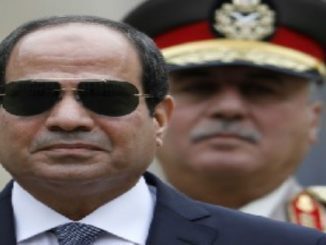
This weekend, Egypt’s court sentenced 75 people to death. The defendants are among more than 700 people accused of or already convicted of playing roles in a 2013 protest against the ouster of then-President Mohamed Morsi.
They include senior members of Morsi’s Muslim Brotherhood, the now-outlawed Islamist party that won power after Egypt’s 2011 pro-democracy uprising before being deposed following a military coup two years later.
Morsi’s place was seized by his defense minister, Abdel Fatah al-Sisi, the general-turned-president who has spearheaded a far-reaching counterrevolution in the years since — largely with the blessing of the West and wealthy Arab allies.
Under the west blessings, al-Sisi’s regime has cracked down not just on Islamists but also on broad section of Egyptian civil society, including journalists, opposition politicians, aid agencies and nongovernmental organizations.
The mass trial, rights groups say, is yet another grim illustration of how far Sisi is willing to go. “This can only be described as a parody of justice,” Naija Bounaim of Amnesty International said in a statement.
“It casts a dark shadow over the integrity of Egypt’s entire system of justice and makes a mockery of due process.”
The Trump administration seems less bothered, described by the Washington Post in its article titled;”Trump carries on U.S. tradition by coddling Egypt’s strongman.”
Last week, US released $195 million in military aid to Egypt, money that had been withheld by the State Department over specific concerns about Egypt’s human rights record under Sisi.
On the other hand, Cairo continues to detain thousands of people on dubious grounds, demolish the homes of innocent villagers in Sinai as part of a heavy-handed counterinsurgency, and silence even moderate critics. But its efforts to address American objections apparently satisfied current Secretary of State Miko Pompeo.
The United States has given Egypt more than %47 billion in military aid and $ 24 billion in economic assistance over the last four decades — an era largely defined by the authoritarian presidency of Hosni Mubarak.
Its latest move only reinforces the message that Washington values Sisi’s stifling of Islamist politics and growing cooperation with Israel over the democratic ideals championed by generations of American presidents.
Michele Dunne, a former State Department official now at the Carnegie Endowment for International Peace in Washington, said,”It’s a signal: Don’t pay attention to anything we say in the future.”
It’s true that the pretense has ended under President Trump, who has made no secret of his admiration for iron-fisted strongmen who keep Islamists and dissenters brutally in check. But he is hardly alone. A bipartisan array of Washington officials and politicians looked on skeptically at Egypt’s fitful democratic progress, viewing the popularly elected Muslim Brotherhood as a lurking menace.
Their fears were echoed and amplified by allies in the Persian Gulf states, who see in political Islam not just the seed of jihadist extremism, but also a threat to their own monarchic power.
A forthcoming book by David Kirkpatrick, former Cairo bureau chief for the New York Times, spotlights the role of the Obama administration in tacitly enabling Sisi’s takeover and reassertion of authoritarian rule.
“That coup was a watershed moment for the region, snuffing out dreams of democracy while emboldening both autocrats and jihadists,” Kirkpatrick wrote in an excerpted piece for the Times.
According to WP, “And American policy pivoted, too, empowering those inside the administration ‘who say you just have to crush these guys,’ said Andrew Miller, who oversaw Egypt for the National Security Council under Mr. Obama … Some of the coup’s most vocal American advocates went on to top roles in the Trump administration, including Secretary of Defense James Mattis and Michael Flynn, Mr. Trump’s first national security adviser.”
Kirkpatrick points to internal disagreements between the Obama White House — brimming with liberal idealists inclined to embrace the pro-democracy upheavals of the Arab Spring — and the senior leadership of the State Department and Pentagon, who were more wary.
According to his and other recent accounts, a former secretary of state John F. Kerry and former defense secretary Chuck Hagel worked to normalize the new status quo under Sisi.
Even the slaughter of hundreds of supporters of Morsi and the elected government at a protest camp in August 2013 couldn’t derail those efforts for long.
The Rabaa Massacre, as the killings are known, is seen as the single bloodiest crackdown since Tiananmen Square in 1989. It led to a halt in sales of certain American military hardware to Egypt and a brief suspension of aid.
“We can’t return to business as usual,” Obama told his advisers after Rabaa, according to a 2016 piece by Politico Micheal Crowley. “We have to be very careful about being seen as aiding and abetting actions that we think run contrary to our values and ideals.”
But Washington did eventually return to business as usual. “In Egypt, what was the alternative? It wasn’t the Jeffersonian democracy,” Kerry, who personally disliked Morsi, later told Kirkpatrick. “Over whatever number of years, we have put about $80 billion into Egypt. Most of the time, this is the kind of government they had — almost all of the time. And the reality is, no matter how much I wish it was different, it ain’t going to be different tomorrow.”
The White House wasn’t going to stick up for a Muslim Brotherhood that, no matter its democratic bona fides, made Washington analysts uneasy and infuriated traditional allies in the region. “The people who wanted to have a different kind of relationship with the Egyptian people, including the president, were on an island in our own government,” Ben Rhodes, Obama’s deputy national security adviser, said to Kirkpatrick.
“There was a sense of inevitability about the military resuming control.”
That sense of resignation has shifted to relief under Trump, who has described Sisi as a “fantastic guy.” But there’s a risk that the current course will create new chaos. “Repression is breeding resentment, and in some cases, radicalization,” Brian Dooley of Human Rights First, an American advocacy group, said to the Times.
“That will ultimately further destabilize Egypt and undermine American interests.”



